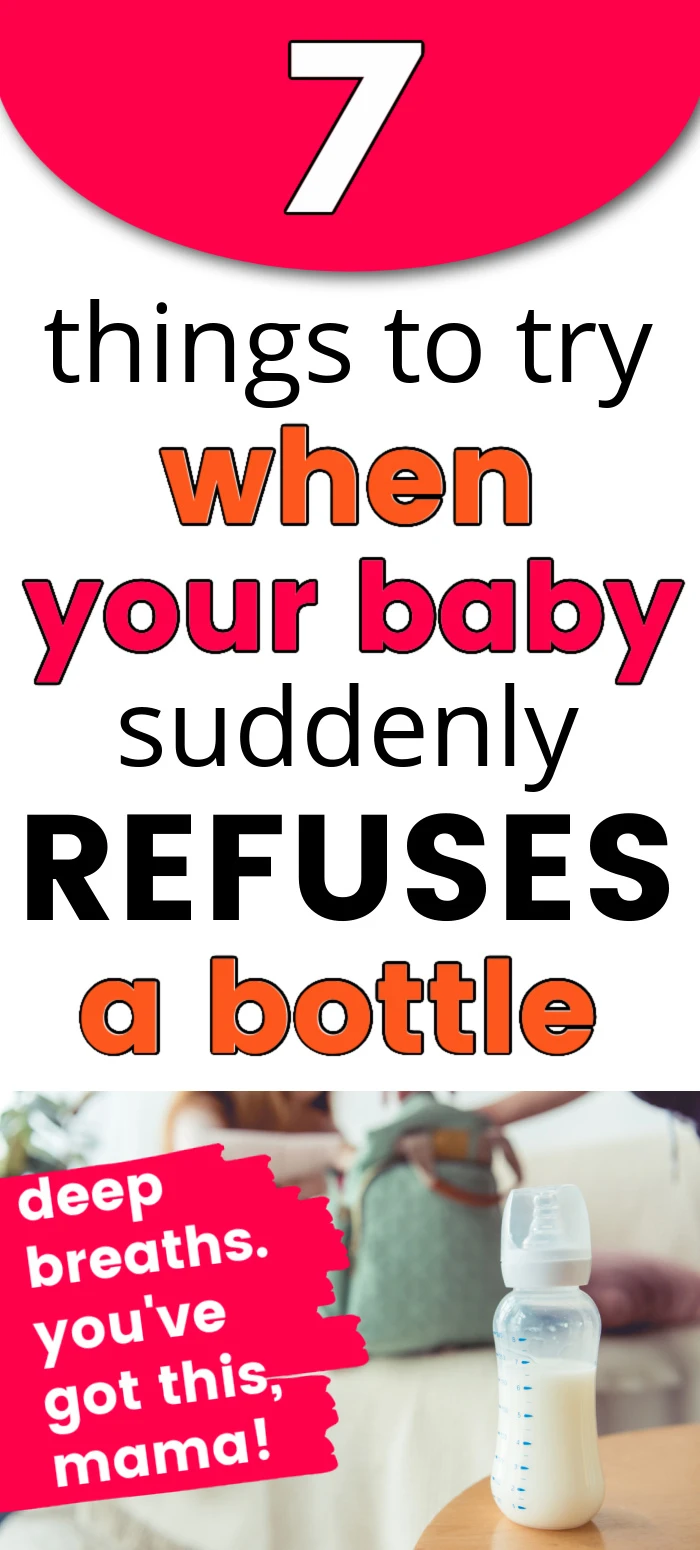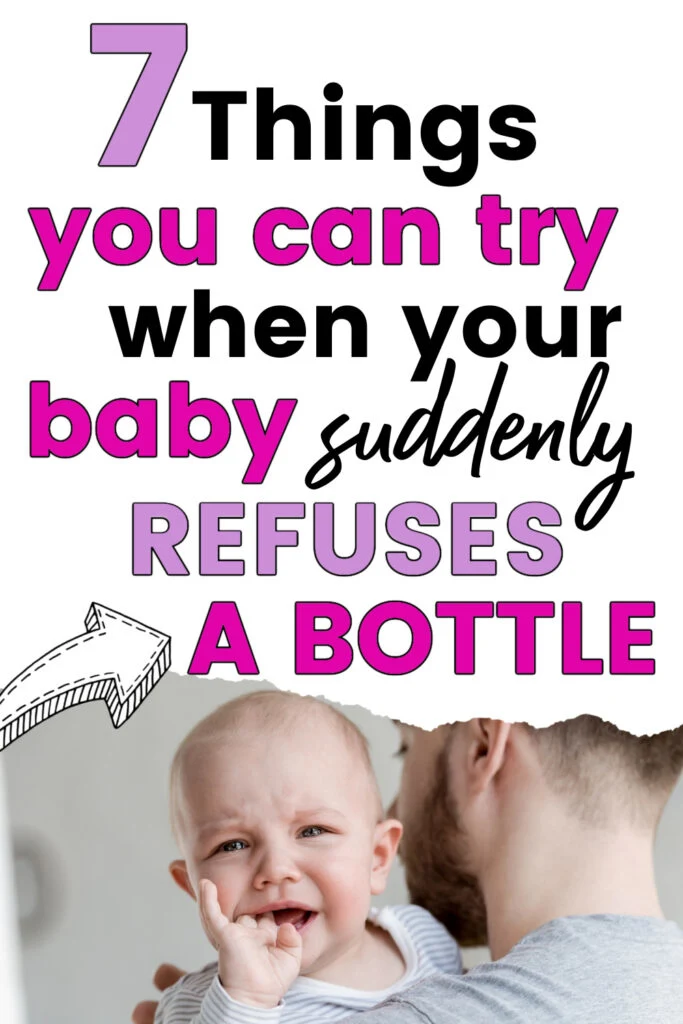Inside: When your baby suddenly refuses a bottle, it’s easy to spiral into full-on mom panic mode. But resist that temptation! Take a deep breath, step into problem-solving mode, instead, and try these 7 things first.
Bottle refusal: yet another fun and exciting problem to add to your list of parenting woes. As if sleep and teething and blow-outs aren’t enough!
Can’t you just get a break already?!
Your baby is taking a bottle just fine, you feel like you’re finally hitting your stride and then all of a sudden, seemingly out of nowhere: BOOM.
Your baby starts refusing a bottle for no apparent reason.
The first time, you try to shrug it off with that laid-back mom confidence – he’ll eat when he’s hungry, right? But then it keeps happening…again and again and again.
A baby refusing to take a bottle can be SO frustrating and stressful for parents. It doesn’t matter whether you’re new to game or an experienced pro: it’s just as stressful (take it from a mom of 5).
So what are you supposed to do when your baby suddenly refuses a bottle?
If your baby suddenly starts refusing a bottle, there are a few different methods you can try. Here are a few of those options:
- Try a different bottle.
- Be persistent.
- Check with your pediatrician for health issues.
There are even more tips and tricks to help you get your baby back to taking a bottle, even if they appear to be committed to the apparent hunger strike.
Read on to discover what could be going on with your baby to cause them to abruptly stop taking a bottle.
You Might Also Like: When Baby Cries In Their Car Seat – 15 Ways to Stop The Screams

7 Things You Can Do When Your Baby Is Suddenly Refusing A Bottle
THIS POST PROBABLY CONTAINS AFFILIATE LINKS. IF YOU LIKE LEGAL JARGON, YOU CAN READ OUR FULL DISCLOSURE POLICY HERE.
There can be a variety of reasons why babies are refusing their bottles.
From changes in routine to health issues that are just now presenting themselves, there is always a reason for bottle refusal. Babies don’t stop eating without a good reason!
And they are usually trying to give you clues, but you might be too stressed to see them clearly. When your baby is taking formula one day, and the next your baby is refusing formula all of a sudden, it’s normal to be a little bit stressed (or a lot stressed).
So take a deep breath, take a step back and check everything.
When you pay attention, your baby might be giving you cues you’ve missed in the stress of it all.
I’m going to share some actionable tips to help you get out of the bottle refusal phase, including:
- Keep trying
- Check formula or breastmilk for freshness
- Use a bottle that simulates breastfeeding
- Ask your pediatrician
- Identify changes in the home
- Make adjustments to feeding routine
- Try a different bottle (even if it’s been fine until now)
1. Keep trying.
When a baby first refuses a bottle, it can be really confusing and will probably trigger all kinds of emotions. But often, patient persistence is the answer.
Here are some tips that can help you keep trying to get your baby to take their bottle.
Try to keep these in mind when you’re repeatedly trying:
- Try keeping the bottle horizontal to the floor. This can help reduce the amount of air in the bottle.
- Let your baby take their time taking the bottle nipple into their mouth: don’t force it.
- Ensure that the bottle is cleaned properly. Leftover soap or milk residue can cause the milk or formula to taste bad.
- Sometimes a distraction or different position can help get your baby to take their bottle, like walking around or rocking in a chair.
2. Check the formula or breastmilk.
Sometimes a baby will refuse a bottle if the contents don’t taste right, regardless of formula or breastmilk. When breastmilk and formula are not stored properly, they can spoil or go bad.
The only way to determine if this is what is causing your baby to refuse the bottle is to taste and smell the formula or breastmilk.
(If you’re visualizing Ross and Joey trying the contents of Rachel’s baby’s bottles right now, you’re not alone.)
But also, preventative measures like proper formula and breast milk storage are the only way to make sure this doesn’t happen.
Related: How to Store Frozen Breast Milk – a New Mom’s Guide
3. Try a bottle that’s closer to breastfeeding.
Babies that breastfeed might refuse a bottle the first few times it’s offered. Once a baby is accustomed to breastfeeding (especially if you haven’t been using a bottle at all), change can be difficult.
If your baby is refusing a bottle and they’re used to being breastfed, it will take some time for them to adjust. If this is the case, try a bottle and nipple combo that’s designed especially for breastfed babies.
Bottles also come out at a different flow than breast milk does from the breast.
When breastfeeding, babies have to “work harder” to get the milk out. This usually can be helped some with getting slow flow bottle nipples.
The slow flow allows the baby to perform the extra work sucking that they usually do on the breast.
Related: Bottle Feeding Essentials – What You Truly Need, and What to Skip
4. Check in with your pediatrician.
A medical issue might be to blame for your baby’s refusal to take a bottle.
If you are concerned at all with any health issues or your baby goes a very long time between feedings, be sure to contact your pediatrician.
You probably already know this, but most pediatricians today allow you to speak to a nurse about your baby’s problem first, and he/she can help you determine the best next steps and whether or not you need to schedule an appointment yet.
Here are a few examples of common medical issues that can make bottle feeding difficult:
- Tongue or lip ties
- Ear infections
- Upset tummy
- Gas
You would think things like tongue or lip ties would be caught right away, but when they aren’t severe, they can fly under the radar if your lactation consultant isn’t paying close attention or you don’t accurately answer her questions about things like how long it takes baby to eat (if it takes a long time, tongue ties can be the culprit).
If you’re a new parent, your baby refusing to eat can be scary. But persistent outright refusal over the course of a day is generally a sign that something is wrong.
Don’t be afraid to call your doctor!
Especially if you can’t push past the stress and anxiety of bottle refusal, it’s better to make the appointment for peace of mind.
5. Look for changes at home.
Unlike adults, babies aren’t able to work through their feelings. So when change happens, no matter how minor, it can cause a baby to refuse a bottle.
Some of these changes to your baby’s environment or routine might include:
- Change in nap routine
- Moving from bassinette or parents’ room to sleeping in a crib
- Parents going back to work after maternity/paternity leave
- New nanny or unfamiliar caretaker
If you suspect any of these might be the issue, it’s important to remain consistent.
Making immediate changes to the bottle itself or feeding routine (outside of what’s necessary) could cause more confusion and make the problem worse.
6. Baby might need a new feeding schedule.
In some cases, a baby will refuse a bottle for the same reason we don’t eat: because they’re full. If your baby is undergoing frequent feedings, this can cause your baby to be overfed.
To try to prevent this from happening, you should:
- Keep track of feedings. If you’re working with an additional caregiver, be consistent with the form you use for records.
- If your baby is exclusively formula-fed, do not go over the recommended amount of feedings your pediatrician has recommended. This is something your pediatrician will help you assess, depending on your baby’s weight.
- If your baby is turning his head in refusal of the bottle and doesn’t seem angry or in pain (i.e., isn’t crying), then it’s likely that they’re not hungry.
Related: Formula Tips and Tricks for the New-to-Formula Mom
7. Try different bottles, even if your baby has been happy with the one you have until now.
I know we already mentioned choosing a bottle specifically for breastfeeding, but if your baby has been using a bottle for a long time with no problem and all of a sudden refuses that familiar bottle, the bottle might be the problem.
First make sure to check the nipple for any tears or bumps, and the plastic bottle opening surrounding the nipple for any nicks that could be hurting your baby.
If there’s nothing apparently wrong, it might be time to consider a new bottle.
There are a ton of different bottles out there. So how do you choose the right one? (Especially after you already thought you found the right one.)
Not every baby will like the same bottle. Some infants may prefer more natural feeling bottles, while others prefer just ordinary bottles.
You must get a bottle that not only suits what your baby prefers but also helps aid in gas and colic prevention.
A good thing to keep in mind is if the bottle fits comfortably in your baby’s mouth. If you’re noticing that your baby is really working hard to make the nipple fit, then it’s probably not a good choice.
There are so many bottle choices out there, it can be overwhelming to choose a new one!
To narrow it down, The Bump shares what they believe to be the 7 best baby bottles HERE.

Oh, Bottle Refusal: This, Too, Shall Pass
Next to getting them to SLEEP, feeding your baby is one of the hardest parts of being a parent, especially if you’re new to the game.
Throw in a baby that’s refusing a bottle, and you’re going to experience an entirely new level of stress!
But once you make it through that first experience of your baby refusing a bottle, you should feel a little more prepared in case it ever happens again. At the very least, you’ll know what to try, and I know, I know, it’s cliche, but you’ll know that “this too shall pass.”
You can’t possibly predict when your baby is going to suddenly refuse bottles. Or when sleep regression will happen, or teething, or any other issue.
But having things to try when it does happen can help this phase to END already, and get your baby right back to taking a bottle, maddeningly enough, like nothing ever happened.
You Might Also Like: Baby Suddenly Hates Diaper Changes? 9 Practical Things You Can Do


Owner of Growing Serendipity, June could talk to you all day about homeschooling, parenting, and minimalism, which she does at This Simple Balance. When she’s not homeschooling, decluttering, or blogging, she loves to enjoy perfect silence while sipping a hot cup of coffee and thinking uninterrupted thoughts—which, of course, with five kids, doesn’t happen very often.